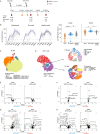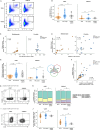Methotrexate treatment hampers induction of vaccine-specific CD4 T cell responses in patients with IMID
- PMID: 39375177
- PMCID: PMC11459311
- DOI: 10.1136/rmdopen-2024-004664
Methotrexate treatment hampers induction of vaccine-specific CD4 T cell responses in patients with IMID
Abstract
Objectives: Methotrexate (MTX) is one of the most commonly used medications to treat rheumatoid arthritis (RA). However, the effect of MTX treatment on cellular immune responses remains incompletely understood. This raises concerns about the vulnerability of these patients to emerging infections and following vaccination.
Methods: In the current study, we investigated the impact of MTX treatment in patients with immune-mediated inflammatory disease on B and CD4 T cell SARS-CoV-2 vaccination responses. Eighteen patients with RA and two patients with psoriatic arthritis on MTX monotherapy were included, as well as 10 patients with RA without immunosuppressive treatment, and 29 healthy controls. CD4 T and B cell responses were analysed 7 days and 3-6 months after two SARS-CoV-2 messenger RNA vaccinations. High-dimensional flow cytometry analysis was used to analyse fresh whole blood, an activation-induced marker assay to measure antigen-specific CD4 T cells, and spike probes to study antigen-specific B cells.
Results: Seven days following two SARS-CoV-2 vaccinations, total B and T cell counts were similar between MTX-treated patients and controls. In addition, spike-specific B cell frequencies were unaffected. Remarkably, the frequency of antigen-specific CD4 T cells was reduced in patients using MTX and correlated strongly with anti-RBD IgG antibodies. These results suggest that decreased CD4 T cell activity may result in slower vaccination antibody responses in MTX-treated patients.
Conclusion: Taken together, MTX treatment reduces vaccine-induced CD4 T cell activation, which correlates with lower antibody responses.
Trial registration number: NL8900.
Keywords: B-lymphocytes; T-lymphocytes; autoimmune diseases; methotrexate.
© Author(s) (or their employer(s)) 2024. Re-use permitted under CC BY-NC. No commercial re-use. See rights and permissions. Published by BMJ.
Conflict of interest statement
Competing interests: FE, GW, SMvH and TWK report (governmental) grants from ZonMw to study immune response after SARS-Cov-2 vaccination in auto-immune diseases. FE also reports grants from Prinses Beatrix Spierfonds, CSL Behring, Kedrion, Terumo BCT, Grifols, Takeda Pharmaceutical and GBS-CIDP Foundation; consulting fees from UCB Pharma and CSl Behring; honoraria from Grifols. All other authors report no disclosures relevant to the manuscript.
Figures




References
-
- Kapetanovic MC, Roseman C, Jönsson G, et al. Antibody response is reduced following vaccination with 7-valent conjugate pneumococcal vaccine in adult methotrexate-treated patients with established arthritis, but not those treated with tumor necrosis factor inhibitors. Arthritis Rheum. 2011;63:3723–32. doi: 10.1002/art.30580. - DOI - PubMed
-
- Kapetanovic MC, Nagel J, Nordström I, et al. Methotrexate reduces vaccine-specific immunoglobulin levels but not numbers of circulating antibody-producing B cells in rheumatoid arthritis after vaccination with a conjugate pneumococcal vaccine. Vaccine (Auckl) 2017;35:903–8. doi: 10.1016/j.vaccine.2016.12.068. - DOI - PubMed
MeSH terms
Substances
LinkOut - more resources
Full Text Sources
Medical
Research Materials
Miscellaneous
